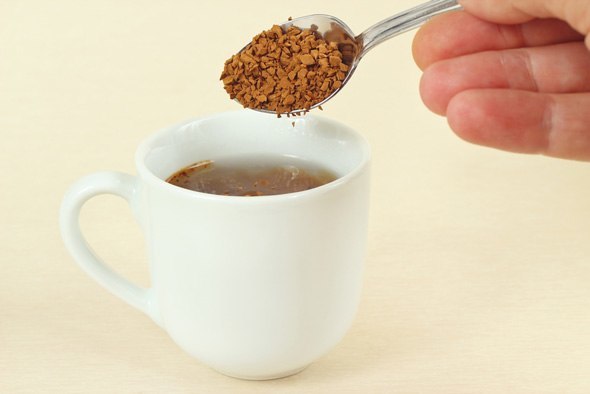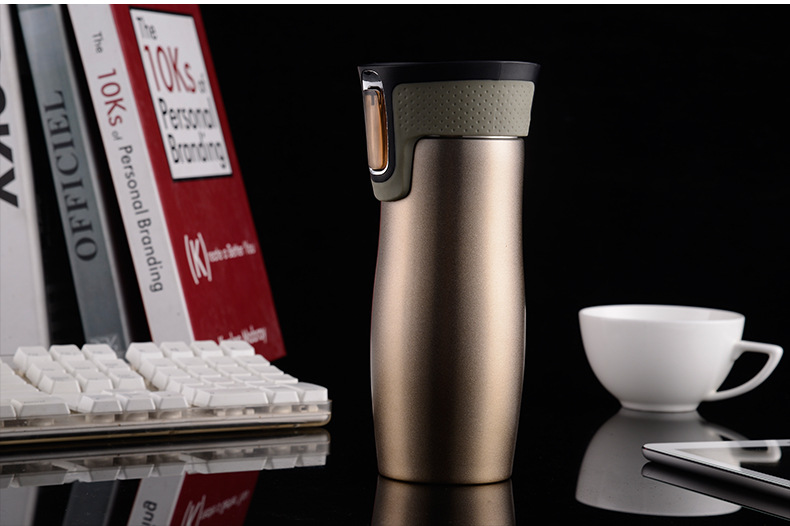October 2016
Dear Customer ,
we will attend the 120th Canton Fair , and we will bring more than one hundreds new time to our customer . welcome our old and new customer visit our booth 1.2F44 from Oct 23th-27th in GuanZhou .See you in the fair .
if you can't come to Canton fair , you can contact with us directly by email , springceramic@vip.163.com . we will send our full new items to you choose .
Best Wish
LiLing Spring Ceramic (brand:custommugcup,SPSCO)
Instant coffee is very popular in many areas of the world.
It may even account for more than 50% of total coffee consumption in some countries.
Instant coffee is also faster, cheaper and easier to make than regular coffee.
As is well-known by now, drinking regular coffee is linked to many health benefits .
But do these benefits apply to instant coffee as well?
This article explains everything you need to know about instant coffee and its health effects.
What is Instant Coffee?
Instant coffee is a type of coffee made from dried coffee extract.
The extract is made by brewing ground coffee beans, similar to when regular coffee is brewed, but more concentrated.
After brewing, the water is removed from the extract to make dry fragments or powder, both of which dissolve when added to water.
There are two main ways to make instant coffee:
- Spray-drying: Coffee extract is sprayed into hot air, which quickly dries the droplets and turns them into fine powder or small pieces.
- Freeze-drying: The coffee extract is frozen and cut into small fragments, which are then dried at a low temperature under vacuum conditions.
Both of these methods preserve the quality, aroma and flavor of the coffee.
The most common way of preparing instant coffee is to add one teaspoon of powder/granules to a cup of hot water.
The strength of the coffee can easily be adjusted by adding more or less to your cup.
Instant Coffee Contains Antioxidants and Nutrients
Coffee is the single biggest source of antioxidants in the modern diet .
This high antioxidant content is believed to be responsible for many of the health benefits linked to drinking coffee .
Like regular coffee, instant coffee contains many powerful antioxidants .
According to one study, instant coffee may contain even more of certain antioxidants than other types, due to the way it is processed .
Furthermore, one standard cup of instant coffee contains only 4 calories, and provides small amounts of potassium, magnesium and niacin (vitamin B3).
Instant Coffee Contains Slightly Less Caffeine
Caffeine is the most widely consumed stimulant in the world, and coffee is its biggest dietary source .
However, instant coffee generally contains slightly less caffeine than regular coffee.
One cup of instant coffee may contain anywhere from 30–90 mg of caffeine, while one cup of regular coffee contains anywhere from 70–140 mg .
Since people differ in their sensitivity to caffeine, instant coffee may be a better choice for those who need to cut back on caffeine .
Instant coffee is also available as decaf, which contains even less caffeine.
Too much caffeine may cause anxiety, disrupted sleep, restlessness, upset stomach, tremor and a fast heartbeat .
Instant Coffee Contains More Acrylamide
Acrylamide is a potentially harmful chemical that forms when coffee beans are roasted .
This chemical is also commonly found in a wide range of foods, smoke, household items and personal care products .
Interestingly, instant coffee may contain up to twice as much acrylamide as fresh, roasted coffee .
Overexposure to acrylamide may damage the nervous system and increase the risk of cancer.
However, the amount of acrylamide you're exposed to through diet and coffee is much lower than the doses that have been shown to be harmful .
Therefore, drinking instant coffee should not cause concern regarding acrylamide exposure.
Like Regular Coffee, Instant Coffee May Have Several Health Benefits
Drinking coffee has been linked to many health benefits.
Given that instant coffee contains the same antioxidants and nutrients as regular coffee, it should have most of the same health effects.
Drinking instant coffee may:
- Enhance brain function: The caffeine can improve brain function .
- Boost metabolism: The caffeine may increase metabolism and help you burn more fat .
- Reduce disease risk: Coffee may reduce the risk of neurodegenerative diseases, such as Alzheimer's and Parkinson's .
- Decrease diabetes risk: Coffee may help reduce the risk of developing type 2 diabetes .
- Improve liver health: Coffee and caffeine may reduce the risk of liver diseases like cirrhosis and liver cancer .
- Improve mental health: Coffee may help lower the risk of depression and suicide .
- Promote longevity: Drinking coffee may help you live longer.
However, it's important to keep in mind that many of these studies were observational in nature.
These types of studies cannot prove that coffee causes the reduction in disease risk, only that people who habitually drink coffee are less likely to get them.
If you're wondering how much coffee to drink, consuming 3–5 cups of instant coffee each day may be optimal. This amount is usually linked with the highest risk reduction in studies .
Should You Drink Instant Coffee?
Instant coffee is quick, easy and doesn't require a coffee maker. It also has a very long shelf life and is cheaper than regular coffee.
Therefore, it may be very handy when you're traveling or on-the-go.
Instant coffee contains slightly less caffeine and more acrylamide than regular coffee, but it contains most of the same antioxidants.
Overall, instant coffee is a healthy, low-calorie beverage that is linked to the same health benefits as other types of coffee.
Some Studies Have Shown That Coffee Can Help You Live Longer
Now we've gone over the short-term effects of coffee/caffeine.
But what about long-term effects, such as how long we live?
A groundbreaking study was published in the New England Journal of Medicine in the year 2012, looking at 402,260 individuals between 50 and 71 years of age .
This graph shows the relationship between coffee consumption and the risk of dying during the 12-13 year study period:
As you can tell from the graph, the "sweet spot" for the lowest risk of death seems to be at 4-5 cups per day.
Two other review studies found that 4 cups and 4-5 cups were associated with the lowest risk of dying over the study periods.
However, I'd like to point out that the research isn't settled on this. One recent study found that 4 or more cups per day were linked to an increased, but not decreased risk of death, in people under 55 years of age .
Coffee Drinkers Have a Lower Risk of Some Diseases
Coffee consumption has also been linked to reduced risk of various diseases.
Here are some of the main findings:
- Type 2 Diabetes: The more coffee people drink, the lower the risk of type 2 diabetes. One study found a 7% decrease for each daily cup .
- Liver Cirrhosis: Drinking 4 or more cups of coffee brings the greatest reduction (up to 84%) in liver cirrhosis, a severe consequence of some liver diseases .
- Liver Cancer: The risk of liver cancer is reduced by 44% for each 2 daily cups per day .
- Alzheimer's Disease: In one study, 3-5 cups per day were linked to a 65% decreased risk of Alzheimer's disease .
- Parkinson's Disease: Coffee is linked to a reduced risk of Parkinson's, with the greatest reduction seen at 5+ cups per day .
- Depression: Studies have shown that 4+ cups of coffee per day are linked to a 20% lower risk of depression and 53% lower risk of suicide .
Looking at this, aiming for 4-5 cups of coffee (or more) seems to be optimal.
It's important to keep in mind that all of these studies are observational in nature. These studies can not prove that coffee caused the reduction in disease, only that the coffee drinkers were less likely to get the disease.
However, given that the results are strong and consistent among many studies, it seems like there could be some truth to them.
In most cases, decaf coffee should have the same beneficial effects. An exception is Parkinson's disease, which seems to be primarily affected by the caffeine.
Caffeine Should be Minimized (or Avoided) During Pregnancy
In pregnant women, caffeine can cross the placenta and reach the fetus, which has problems metabolizing caffeine.
Some studies have linked a high consumption of caffeine in pregnancy to increased risk of miscarriage, stillbirth, premature delivery and lower birth weight.
It is generally recommended that women limit their intake to 100-200 mg of caffeine per day (about 1-2 cups of coffee).
However, many experts recommend avoiding coffee completely during pregnancy. If you want to be absolutely safe, then this is a smart choice.
4-5 Cups May be The Sweet Spot
From looking at the evidence, it seems like 4-5 cups per day may be the optimal amount to drink.
This amount is linked to the lowest risk of premature death, and a lower risk of numerous common diseases, some of which affect hundreds of millions of people.
Of course, this doesn't mean that people need to drink coffee.
People who are caffeine sensitive, have certain medical conditions or simply don't like coffee, should definitely avoid it.
Also, if you like coffee but it tends to give you anxiety or interfere with your sleep, then you may be doing more harm than good.
It's important to remember that it is easy to negate the benefits of coffee by adding sugar or other unhealthy, high-calorie ingredients to it.
For some tips on getting the maximum amount of benefit from your coffee, read this article on 8 ways to make your coffee super healthy.
Take Home Message
For people who enjoy drinking coffee, there is very little evidence of harm and plenty of evidence of benefit.
Even though 4-5 cups per day may be optimal, many people can tolerate more than that without any problems.
If you like drinking a lot of coffee, then there doesn't seem to be any good reason to discourage it.
I personally average around 5-6 cups per day. Some days more, some days less.
I've been drinking this amount for years now, and my health has never been better.
Coffee is controversial.
Depending on who you ask, it is either a wonderful beverage or addictive poison.
I've looked at the science, and it seems pretty clear that coffee has been unfairly demonized.
Coffee is actually a complex beverage, with hundreds of bioactive compounds.
In fact, it is the single biggest source of antioxidants for many people .
Studies also show that coffee drinkers have a lower risk of diseases like type 2 diabetes, neurological disorders and liver diseases .
However, just because a little bit of something is good, it doesn't mean that a whole lot is necessarily better, or even safe.
So, how much coffee is too much, and what is the "sweet spot" to maximize the health benefits while minimizing the risks?
Let's find out…
How Much Caffeine is in a Cup of Coffee?
The active ingredient in coffee is caffeine, the most commonly consumed psychoactive substance in the world .
The caffeine content in a cup of coffee is highly variable, ranging from 50 to 400+ mg per cup.
A small home-brewed cup of coffee could contain 50 mg, while a big 16 oz Starbucks grande can contain over 300 mg.
As a general rule, you can assume that an average 8 ounce cup of coffee contains around 100 mg of caffeine.
Several sources suggest that 400 mg of caffeine, or 4 cups of coffee, are safe for most healthy adults .
However, many people (including myself) drink much more than that without any issues.
Keep in mind that there are many other sources of caffeine besides coffee, including tea, soft drinks, energy drinks, chocolate and certain medications .
Short-Term Symptoms of Too Much Caffeine
When it comes to the health effects of coffee, there are both short- and long-term symptoms.
Let's talk about the short-term symptoms first, which are mostly related to the caffeine itself.
Caffeine works primarily in the brain, where it affects the function of neurotransmitters and exerts a stimulant effect.
If you drink too much coffee in a short amount of time, you will experience symptoms mostly related to your brain and digestive system.
Here are some common symptoms of ingesting too much caffeine:
- Restlessness.
- Anxiety.
- Dizziness.
- Upset stomach.
- Irritability.
- Insomnia.
- Fast heartbeat.
- Tremors.
If you experience such symptoms after drinking coffee, then you may be sensitive to caffeine and may want to cut back your intake (or simply avoid caffeine altogether).
It is possible to die from a caffeine overdose, but this is next to impossible to do with coffee alone. You would have to drink more than 100 cups in a single day.
People Tolerate Varying Amounts of Coffee/Caffeine
Caffeine affects people in different ways. Many genes have been discovered that affect our sensitivity to caffeine
These genes have to do with the enzymes that break down caffeine in the liver, as well as receptors in the brain that are affected by caffeine.
The effects of caffeine on sleep are also genetically determined . Some people can drink coffee and go to sleep right after, for others it keeps them awake throughout the night.
Depending on your genetic makeup, you may tolerate a lot of caffeine, or very little. Most people are somewhere in the middle.
People's individual tolerance is also very important. Those who drink coffee every day can tolerate much more than those who drink it only rarely.
It's also important to realize that medical conditions can affect sensitivity to caffeine.
If you have anxiety, panic disorder, heart arrhythmia, high blood pressure, diabetes, take medication or have any sort of medical condition, then you may tolerate less caffeine and should speak to a doctor.
To be continued ...
Order personalized travel mugs in bulk for all your promotional needs and take advantage of our cheap wholesale prices. These personalized travel mugs,vacuum insulated coffee mugs come in a variety of colors and styles that can be printed with your logos or names to be distributed among your most valued customers and employees. A great promotional opportunity, these plastic and metal travel tumblers are ideal for those on the go.At CustomMugCup we're here for you.














